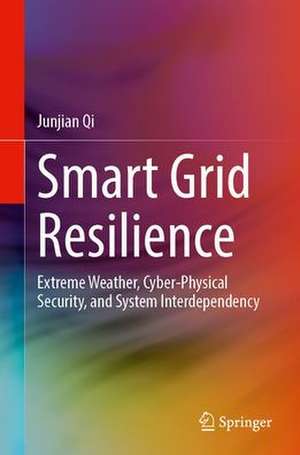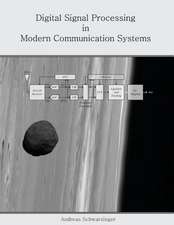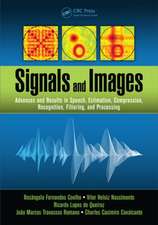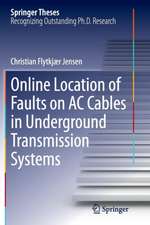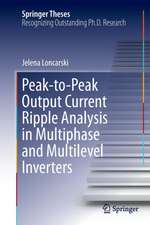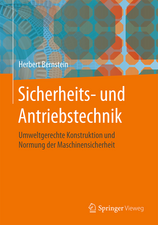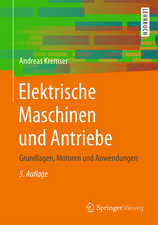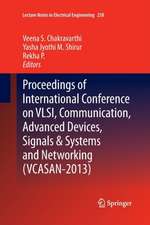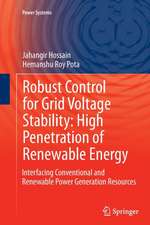Smart Grid Resilience: Extreme Weather, Cyber-Physical Security, and System Interdependency
Autor Junjian Qien Limba Engleză Hardback – iul 2023
Smart Grid Resilience: Extreme Weather, Cyber-Physical Security, and System Interdependency is an essential guide for a broad audience of practicing professionals, including policymakers, electric utility engineers, and transmission and distribution system operators. It will also be a valuable reference for students and researchers.
Preț: 950.66 lei
Preț vechi: 1159.34 lei
-18% Nou
Puncte Express: 1426
Preț estimativ în valută:
181.91€ • 190.80$ • 151.44£
181.91€ • 190.80$ • 151.44£
Carte tipărită la comandă
Livrare economică 01-15 aprilie
Preluare comenzi: 021 569.72.76
Specificații
ISBN-13: 9783031292897
ISBN-10: 3031292898
Ilustrații: XIV, 285 p. 1 illus.
Dimensiuni: 155 x 235 mm
Greutate: 0.59 kg
Ediția:2023
Editura: Springer International Publishing
Colecția Springer
Locul publicării:Cham, Switzerland
ISBN-10: 3031292898
Ilustrații: XIV, 285 p. 1 illus.
Dimensiuni: 155 x 235 mm
Greutate: 0.59 kg
Ediția:2023
Editura: Springer International Publishing
Colecția Springer
Locul publicării:Cham, Switzerland
Cuprins
Part 1: Extreme Weather and Cascading Failure.- Chapter 1. Cascading Failures Under Extreme Temperatures.- Chapter 2. Cascading Failure Interaction Analysis.- Chapter 3. Integrated Preventive and Emergency Responses.- Part 2: Cybersecurity of Smart Grid Monitoring.- Chapter 4. Risk Mitigation against Cyber Attacks Based on Dynamic State Estimation.- Chapter 5. Comparing Kalman Filters and Observers against Cyber Attacks.- Chapter 6. Self-Healing PMU Network against Cyber Attacks.- Part 3: Cyber-Physical Security for Distributed Energy Resources.- Chapter 7. Cyber-Physical Security Research Framework for Distributed Energy Resources.- Chapter 8. Distributed Load Sharing under Cyber Attacks.- Chapter 9. Deep Learning Based Attack Detection for Microgrid Control.- Part 4: Smart Grid Resilience under System Interdependency.- Chapter 10. Interdependency between Power System Outages by Branching Process.- Chapter 11. Interdependency between Power System Outages by Coupled Interaction Model.- Chapter 12. Interdependency between Smart Grid and Transportation Network.
Notă biografică
Dr. Junjian Qi is an Assistant Professor in the Department of Electrical and Computer Engineering at Stevens Institute of Technology. He obtained his Ph.D. in Electrical Engineering from Tsinghua University, Beijing, China, in July 2013. He was a Research Associate with the Min H. Kao Department of Electrical Engineering and Computer Science, University of Tennessee, Knoxville, TN, USA from 2013 to 2015, a Postdoctoral Appointee with the Energy Systems Division, Argonne National Laboratory, Lemont, IL, USA from 2015 to 2017, and an Assistant Professor with the Department of Electrical and Computer Engineering, University of Central Florida, Orlando, FL, USA from 2017 to 2020. He was the recipient of the NSF CAREER award in 2020. His research interests include cascading blackouts, microgrid control, cyber-physical system security, and synchrophasors.
Textul de pe ultima copertă
This book provides a comprehensive overview and in-depth discussion of smart grid resilience. It covers the three most critical resilience problems facing smart grids—resilience against extreme weather, resilience against cyber-physical attacks, and resilience under system inter-dependency. Each of these topics increases the risk of large-scale system-wide cascading failures. In-depth chapters allow the reader to define and quantify the smart grid’s ability to deal with extreme events and the critical infrastructures systems that connect it. Methods for improving system design are introduced along with effective strategies for protecting the system with minimal disruption of power supply and economic and social losses in extreme conditions.Smart Grid Resilience: Extreme Weather, Cyber-Physical Security, and System Interdependency is an essential guide for a broad audience of practicing professionals, including policymakers, electric utility engineers, and transmissionand distribution system operators. It will also be a valuable reference for students and researchers.
- Provides the most comprehensive and up-to-date overview of smart grid resilience;
- Reveals the most important vulnerabilities and develops corresponding risk mitigation strategies;
- Discusses system-wide cascading failure modeling and investigation.
Caracteristici
Provides the most comprehensive and up-to-date overview of smart grid resilience Reveals the most important vulnerabilities and develops corresponding risk mitigation strategies Discusses system-wide cascading failure modeling and investigation
